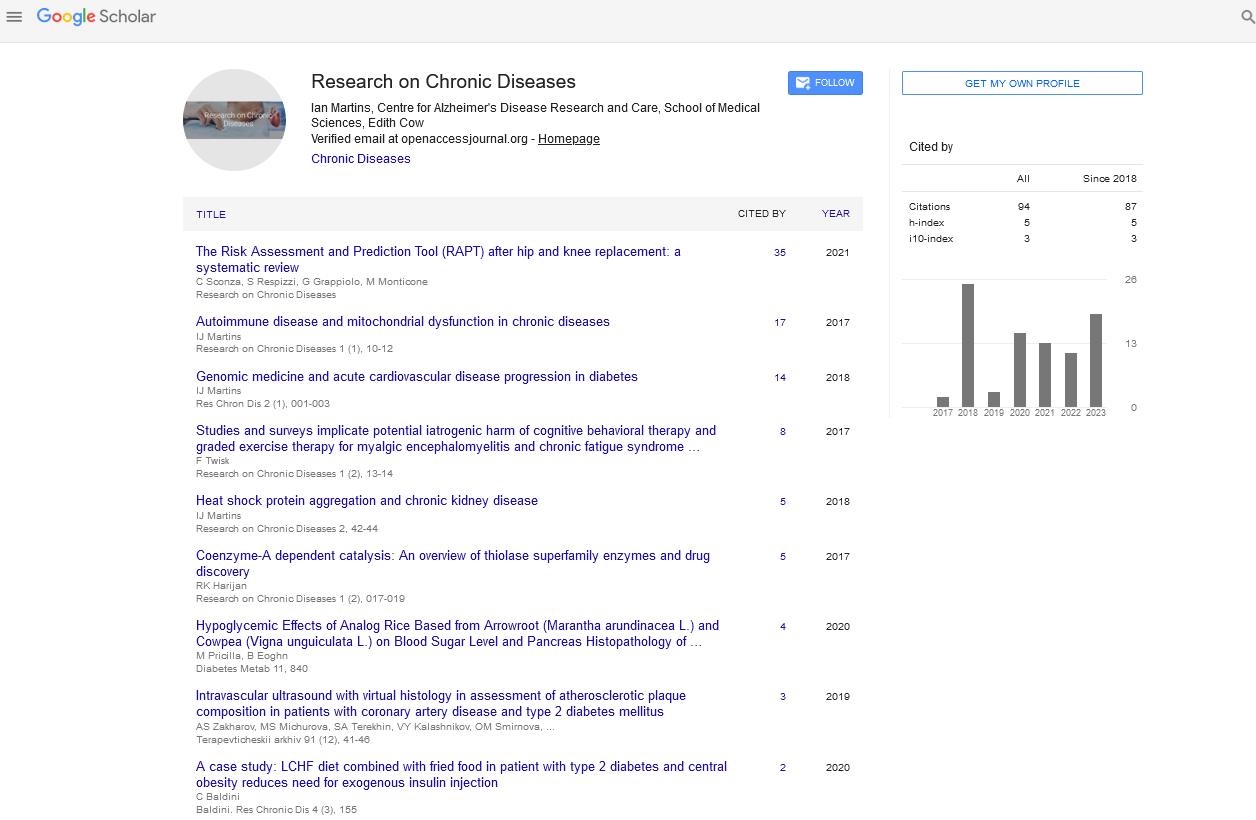Perspective - Research on Chronic Diseases (2024) Volume 8, Issue 4
Understanding Chronic Renal Failure: A Comprehensive Overview
- Corresponding Author:
- Yusriadi Yusriadi
Department of Nephrology,
Technical University of Kalamata,
Kalamata,
Greece
E-mail: yusriadii@uqconnect.edu.au
Received: 04-Jul-2024, Manuscript No. oarcd-24-140748; Editor assigned: 09-Jul-2024, PreQC No. oarcd-24-140748 (PQ); Reviewed: 23-Jul-2024, QC No. oarcd-24-140748; Revised: 01-Aug-2024, Manuscript No. oarcd-24-140748 (R); Published: 29-Aug-2024, DOI: 10.37532/OARCD.2024.8(4).208-209
Introduction
Chronic renal failure (CRF), also known as chronic kidney disease (CKD), is a progressive condition characterized by the gradual loss of kidney function over time. This debilitating disease affects millions of people worldwide, leading to significant morbidity and mortality. The kidneys, essential organs responsible for filtering waste products and excess fluids from the blood, become increasingly impaired, resulting in a buildup of harmful substances in the body. This article delves into the causes, symptoms, diagnosis, management and prevention of chronic renal failure.
Description
Causes of chronic renal failure
Chronic renal failure can be attributed to various underlying conditions and factors. The most common causes include.
Diabetes mellitus: High blood sugar levels associated with diabetes can damage the blood vessels in the kidneys, impairing their function. Diabetic nephropathy is a leading cause of CKD.
Hypertension: Elevated blood pressure puts extra strain on the kidneys’ blood vessels, leading to damage over time. Hypertensive nephrosclerosis is another significant contributor to CKD.
Glomerulonephritis: This group of diseases causes inflammation and damage to the kidney’s filtering units, the glomeruli. Chronic glomerulonephritis can progress to renal failure if left untreated.
Polycystic kidney disease: An inherited disorder characterized by the formation of cysts in the kidneys, leading to progressive kidney damage and loss of function.
Obstructive uropathy: Conditions that block the flow of urine, such as kidney stones or an enlarged prostate, can cause pressure buildup and kidney damage over time.
Chronic pyelonephritis: Recurrent kidney infections can lead to scarring and loss of kidney function.
Diagnosis of chronic renal failure
Early diagnosis of chronic renal failure is crucial for effective management and slowing the progression of the disease. The diagnostic process typically involves the following steps.
Medical history and physical examination: A thorough review of the patient’s medical history and a physical examination to identify risk factors and symptoms.
Blood tests: Measurement of serum creatinine and Blood Urea Nitrogen (BUN) levels to assess kidney function. Estimated Glomerular Filtration Rate (eGFR) is calculated to determine the stage of CKD.
Urine tests: Analysis of urine for the presence of protein, blood and other abnormalities. A urine Albumin-to-Creatinine Ratio (ACR) can help detect early kidney damage.
Imaging studies: Ultrasound, CT scans or MRI may be used to visualize the kidneys and identify structural abnormalities.
Kidney biopsy: In some cases, a small sample of kidney tissue may be obtained and examined under a microscope to determine the underlying cause of kidney damage.
Management of chronic renal failure
The management of chronic renal failure focuses on slowing the progression of the disease, managing symptoms and preventing complications. Key components of CKD management include.
Lifestyle modifications: Diet-a kidneyfriendly diet low in sodium, potassium and phosphorus is crucial. Reducing protein intake can also help decrease the workload on the kidneys. Exercise-regular physical activity can help control blood pressure, blood sugar levels and overall health. Smoking cessation-quitting smoking can slow the progression of kidney disease and reduce the risk of cardiovascular complications.
Dialysis: Hemodialysis-in this procedure, a machine filters waste products and excess fluids from the blood. Peritoneal dialysis-a catheter is used to fill the abdominal cavity with a dialysis solution that absorbs waste products and is then drained. Kidney transplantation: for patients with End-Stage Renal Disease (ESRD), a kidney transplant may be the best option. This involves replacing the damaged kidney with a healthy donor kidney.
Prevention of chronic renal failure
Preventing chronic renal failure involves addressing the underlying risk factors and adopting a healthy lifestyle. Key preventive measures include.
Managing chronic conditions: Effective management of diabetes, hypertension and other chronic conditions can significantly reduce the risk of CKD.
Regular health screenings: Routine check-ups and screenings for kidney function, especially for individuals at high risk, can help detect early signs of kidney damage.
Healthy diet: A balanced diet low in salt, sugar and unhealthy fats can help maintain overall health and reduce the risk of CKD.
Conclusion
Chronic renal failure is a complex and progressive condition with significant health implications. Understanding the causes, recognizing the symptoms and seeking early diagnosis are crucial for effective management. By adopting a healthy lifestyle, managing underlying conditions and adhering to medical advice, individuals can slow the progression of CKD and improve their quality of life. As medical research advances, new treatments and preventive strategies continue to emerge, offering hope for those affected by this challenging disease.
